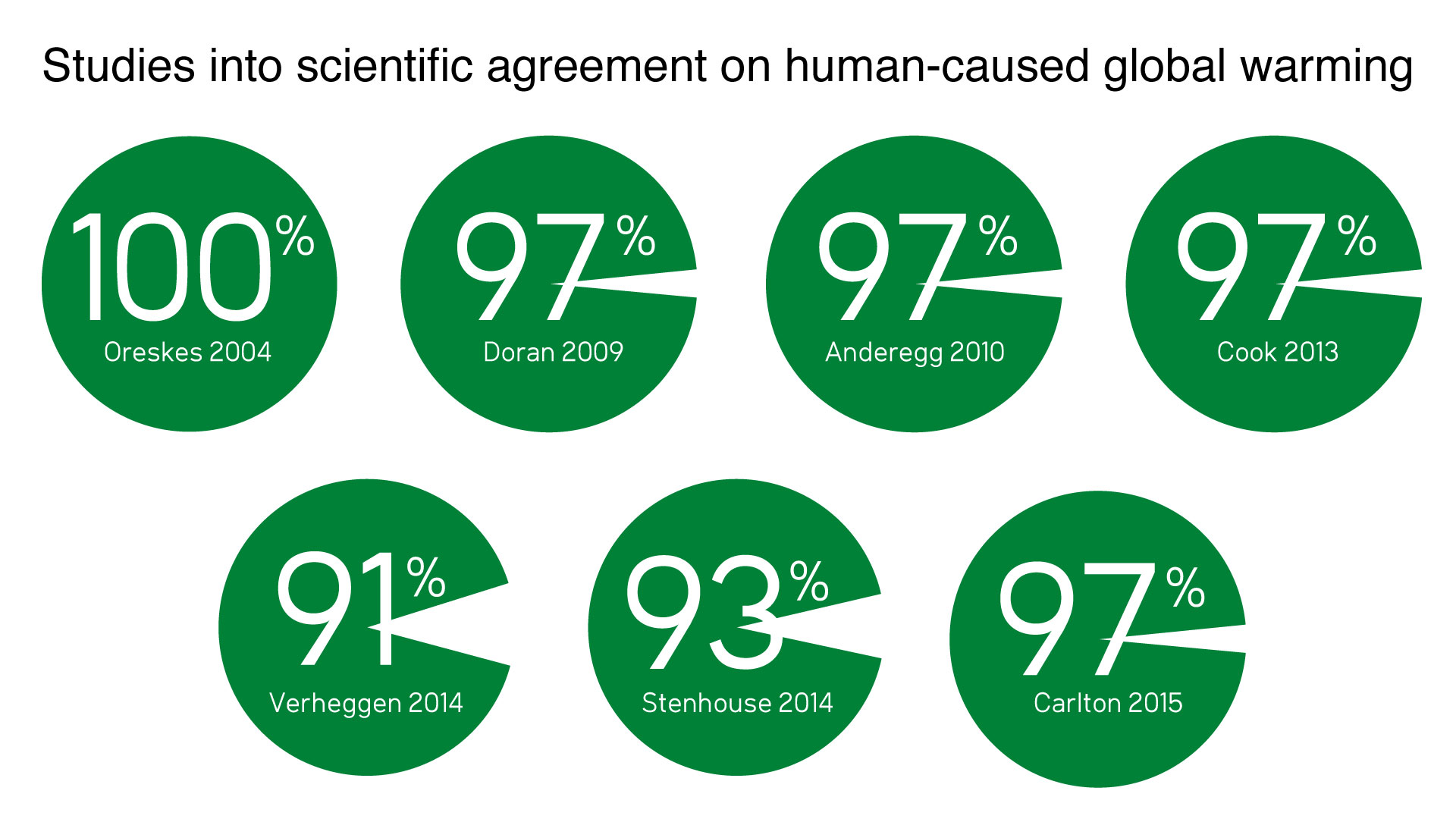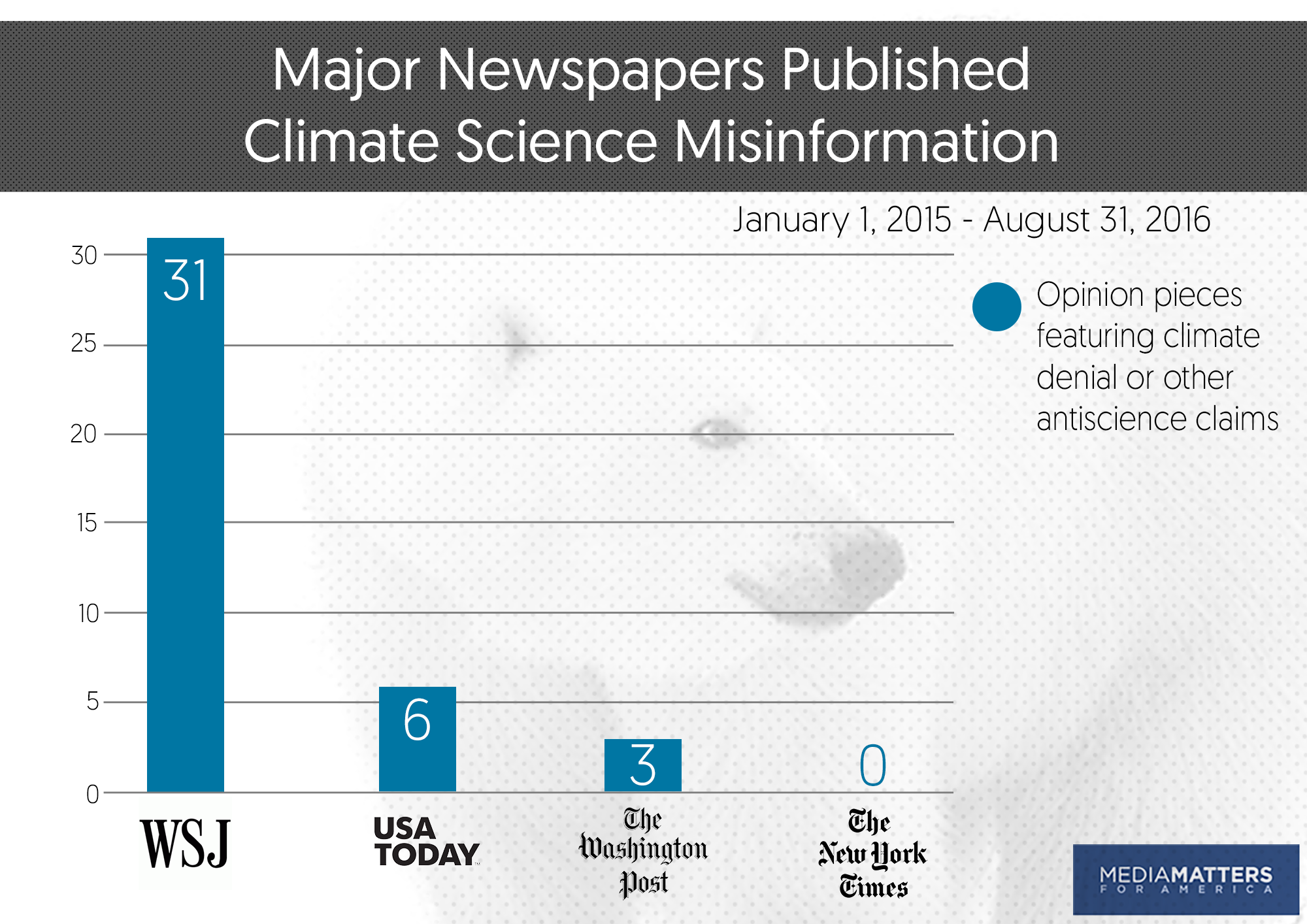The 10 Most Ridiculous Things Media Figures Said About Climate Change And The Environment In 2017
Reprinted with permission from MediaMatters.
1. Breitbart’s James Delingpole claimed 400 new scientific papers show global warming is a myth.
Numerous studies have found near-unanimous scientific agreement on human-caused climate change, with perhaps the most well-known study on the matter finding that 97 percent of scientific papers taking a position on the cause of global warming agree that humans are behind it. And this year, a review of the 3 percent of papers that deny climate change found that they were all flawed. Nonetheless, Breitbart writer Delingpole claimed that 400 scientific papers published this year demonstrated that climate change is a “myth,” basing his article on a post on the denialist blog No Tricks Zone.The fact-checking website Snopes roundly debunkedDelingpole’s article, giving it a “False” verdict after speaking with authors of some of the cited papers who said their work was grossly misinterpreted or misrepresented.
2. The Daily Mail claimed government researchers “duped” world leaders with “manipulated global warming data.”
Daily Mail reporter David Rose alleged that climate scientists “rushed” to publish an “exaggerated” paper in an attempt to convince leaders to support the Paris agreement and spend billions to fight climate change. Rose, who has written his fair share of climate misinformation for the Mail, based his story on an “exclusive interview” with and a blog post by retired U.S. government scientist John Bates. The error-ridden article quickly made its way around right-wing media in outlets such as The Daily Caller, National Review, and Breitbart, and was even promoted by GOP members of the House science committee, including its chairman Rep. Lamar Smith (R-TX). The story’s claims also received “at least 752,300 shares, likes, comments, or other interactions on social media,” according to a Buzzfeed analysis. But the claims in the article were widelydiscredited by climate scientists, including Bates’ former colleagues and even Bates himself. The errors in the Mail’s article were so significant that the Independent Press Standards Organization (IPSO), an independent media regulator in the U.K., issued a ruling that “the newspaper had failed to take care over the accuracy of the article … and had then failed to correct … significantly misleading statements.” The Daily Mail was required to publish IPSO’s reprimand.
3. Radio host Rush Limbaugh said he was “leery” of hurricane forecasts because they advance a “climate change agenda.”
As Hurricane Irma barrelled toward Florida, Limbaugh spun conspiracy theories and told his listeners that hurricane warnings are part of a scheme to benefit retailers, the media, and people like Al Gore who want to “advance this climate change agenda.” Notably, Limbaugh didn’t have any skepticism about the danger Irma posed when it came to his own well-being, as he fled from his Florida home to Los Angeles before Irma made landfall. It’s not the first time Limbaugh has spouted irresponsible conspiracy theories about hurricane forecasts. He was criticized last year for doing the same thing during Hurricane Matthew, earning himself a spot on the 2016 edition of this list.
4. New York Times columnist Bret Stephens argued that because political operatives were wrong in predicting Hillary Clinton would win the election, people should be skeptical of climate science.
After Trump’s election, The New York Times launched an ad campaign billing itself as the antidote to Trumpian “alternative facts.” Shortly after that campaign, though, the Times hired Stephens as a columnist — a serial misinformer who had called climate change a “sick-souled religion” during his time at The Wall Street Journal. In his inaugural column for the Times, Stephens encouraged skepticism of climate scientists and compared those who advocate climate action to Cold War-era authoritarians. Stephens’ column was short on actual facts and science; the one time he cited a scientific report, he got it wrong. The Times added a correction to the column, but numerous scientists pointed out that the correction wasn’t sufficient, and a number of scientists canceled their subscriptions over Stephens’ hiring, his problematic column, and the Times public editor’s dismissive defense of Stephens’ column. EPA Administrator Scott Pruitt later cited Stephens’ column to defend the Trump administration’s decision to pull out of the Paris agreement.
5. Conservative media commentator Stephen Moore claimed that Trump created tens of thousands of coal jobs in the first few months of his presidency.
Experts and journalists have repeatedly noted that President Donald Trump’s campaign promise to bring back coal jobs is an empty one, since the decades-long decline in coal mining jobs has been driven much more by economic forces, such as increased automation and competition from natural gas and renewables, than by government regulations. But that didn’t stop Moore, a frequent Fox and CNN commentator and former Trump economic advisor, from proclaiming in op-eds in The Washington Times and Breitbart that Trump had already made good on his promise after just a few months in office. Moore cited jobs reports from March and April to claim that Trump had added tens of thousands of mining jobs, thereby restoring the coal industry. But Moore grossly misrepresented the data he cited, which actually included jobs in a number of sectors like oil and gas. Had Moore bothered to look at the actual coal mining jobs category, he would have seen that it had only grown by approximately 200 jobs through April, barely moving since Election Day.
6. Radio host Hugh Hewitt recommended appointing Rush Limbaugh to a national commission to study climate change.
In an op-ed for The Washington Post, Hewitt proposed creating a “national commission led by men and women of impeccable credentials” to determine whether and how the U.S. should address climate change, arguing that the country needs a group of “[d]iverse, smart non-scientists who are going to listen to the scientists — all of them — and report back on what ought to be done.” But Hewitt’s proposal instantly lost all credibility when he suggested including Rush Limbaugh as one of the commission members. Limbaugh has repeatedly called climate change a hoax, promoted dangerous climate-related conspiracy theories, misrepresented research in an attempt to dispute that global warming is happening, and even criticized a TV show for portraying climate change as a reality.
7. Fox hosts attacked a journalist and called him “stupid” for asking a Trump official about the links between hurricanes and climate change.
2017 was a record year for hurricanes, as Harvey, Irma, and Maria wreaked havoc along their respective paths. A number of climate scientists have explained how climate change exacerbates some of the worst impacts of hurricanes. While CNN and MSNBC frequently aired segments discussing the link between climate change and hurricanes like Harvey and Irma, Fox News hosts almost exclusively covered the climate change-hurricane link by criticizing others who raised the issue. The September 11 episode of Fox’s The Five, for example, featured a lengthy discussion in which hosts criticized CNN’s Jim Acosta for asking Homeland Security Advisor Tom Bossert whether there’s a link between climate change and powerful hurricanes. The hosts said that Acosta was “anti-science” and looked “stupid” and “dumb,” and they called his question was “politically opportunistic.” Fox’s Jesse Watters said concern about climate change stems from liberal “guilt” and a desire to control people’s lives. Likewise, on the radio show Breitbart News Daily, host Alex Marlow pushed EPA Administrator Scott Pruitt to deny the link between climate change and hurricanes, which Pruitt did, stating, “For opportunistic media to use events like this to, without basis or support, just to simply engage in a cause-and-effect type of discussion, and not focus upon the needs of people, I think is misplaced.”
8. Rush Limbaugh argued that the historic BP oil spill caused no environmental damage.
Limbaugh cited an article in the right-wing Daily Caller headlined “Bacteria Are Eating Most Of The 2010 BP Oil Spill” and concluded, “The BP spill didn’t do any environmental [damage].” The Deepwater Horizon spill, which leaked oil for 87 days, was the largest accidental spill of oil into marine waters in world history. Researchers have documented a wide array of negative environmental impacts from the disaster. For example, a 2016 study found that the BP spill may have caused irreversible damage to one of the Gulf shore’s most important ecosystems. The spill is believed to have killed tens of thousands animals in 2010, and for years afterward, dolphins and other animals in the area continued to die at higher-than-normal rates.
9. Fox News’ Jesse Watters claimed, “No one is dying from climate change.”
During a discussion about Al Gore’s warnings on climate change, Watters, a co-host of Fox News’ The Five, declared, “People are dying from terrorism. No one is dying from climate change.” Rush Limbaugh also made the same assertion this year. But an independent report commissioned by 20 governments in 2012 concluded that climate change already kills more people than terrorism, with an estimated 400,000 deaths linked to climate change each year.
10. Radio host Alex Jones said it was “suspicious” that Hurricane Irma came along shortly before the release of a climate disaster movie.
Jones briefly speculated about the possibility that Hurricane Irma was “geoengineered” or created by humans before stating, “Meanwhile, though, right on time with these superstorms, we have the new film Geoengineering (sic) 2017, coming soon on October 20. Oh, just a little bit more than a month or so after Irma is set to hit. Isn’t that just perfect timing? Like all these race war films they’ve been putting out. This is starting to get suspicious. Here it is, Geostorm.” The action movie Geostorm featured satellites that controlled the global climate. Jones’ speculation about the film is just one of the countless conspiracy theories he has promoted over the years.
Header image by Sarah Wasko / Media Matters










